SEN Makiko Presents Introduction to Chado in St. Petersburg, Russia
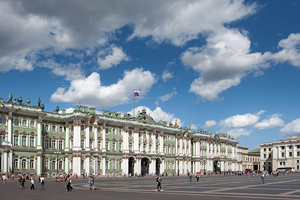 |
| St. Petersburg State Hermitage Museum |
| SEN Makiko, daughter of Iemoto SEN Soshitsu XVI, made a trip to Russia August 23–28, 2015, to present a public introduction to chado at the State Hermitage Museum in St. Petersburg in conjunction with the exhibition "Raku: The Cosmos in a Tea Bowl" being held at the museum (July 10–September 6, 2015). She undertook this important project in response to a request from the Japan Foundation and Raku Museum. Her father's cousin, SAKURAI Yukiko, and the latter's husband, accompanied her on this trip. Others who attended the event from Japan were RAKU Fujiko and Atsundo, the wife and the elder son, respectively, of the current head of the Raku family and its pottery tradition, RAKU Kichizaemon XV, who had been in St. Petersburg for the exhibition's opening on July 10. AMAE Hidemi, wife of the former ambassador of Japan to Ukraine, AMAE Kishichiro (President of the Urasenke International Association), was also present for this visit by Makiko. Arriving in St. Petersburg the evening of the 23rd, Makiko and Mr. and Mrs. Sakurai the following day attended a luncheon together with RAKU Fujiko and Atsundo and AMAE Hidemi, hosted by Consul-General YAMAMURA Yoshihiro of the Japanese Consulate-General in St. Petersburg at his official residence. |
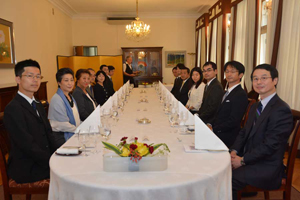 |
| Makiko's chado introduction program at the State Hermitage Museum was on the 25th, from 1:00 in the afternoon, in the Hermitage Theatre. Before the program began, she visited the museum's director, Mikhail PIOTROVSKY, at his office, and also went to see the Raku exhibition. This exhibition was first mounted in the spring of this year at the Pavilion for Japanese Art at the Los Angeles County Museum of Art, USA, and from there it had now moved to this grand old museum in St. Petersburg, Russia. |
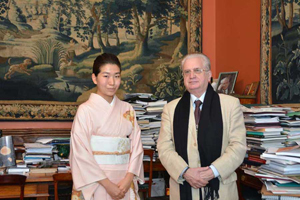 |
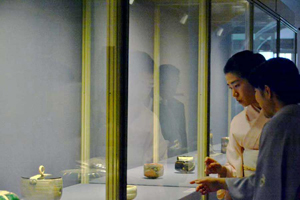 |
| Makiko with Museum Director Mikhail PIOTROVSKY. | Makiko tours the Raku exhibition with RAKU Fujiko. |
| For the program, more than 250 attendees packed the theater. A welcoming address was given by the museum's academic secretary, Miriam DANDAMAYEVA, and, representing the special invited guests from Japan, Consul-General Yamamura gave a greeting speech. Makiko then came to the podium and delivered a lecture about chado and the Urasenke chado tradition. This was followed by a demonstration of a simple tea gathering, for which Makiko provided explanations. Serving as Makiko's translator was Ludmila VASILJEVA of the Urasenke Tankokai Moscow Association (UTMA). |
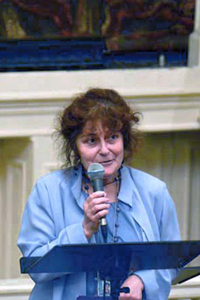 |
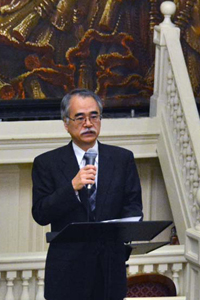 |
| Academic Secretary Miriam DANDAMAYEVA | Japanese Consul-General YAMAMURA Yoshihiro |
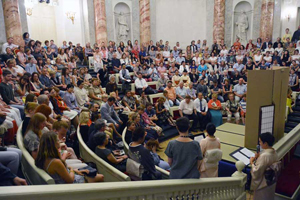 |
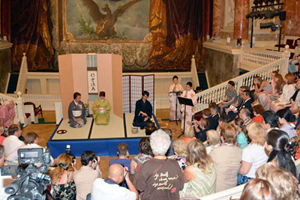 |
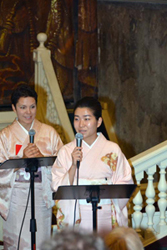 |
| Makiko explains about chado and Ludmila VASILJEVA translates. |
| That evening, Makiko hosted a small dinner party at the Four Seasons Hotel, inviting those who had been of special assistance to her for this St. Petersburg project. Before the dinner, the members of the Urasenke St. Petersburg group (UTMA St. Petersburg sub-group) prepared matcha for everyone at an area in the room which they had specially arranged for this. At the dinner, Makiko expressed her thanks to everyone, they all celebrated the success of the program at the State Museum, and Consul-General Yamamura offered a toast. |
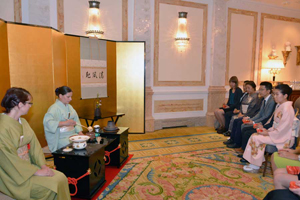 |
| Urasenke St. Petersburg group serves tea to everyone preceding the dinner. |
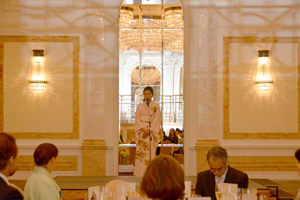 |
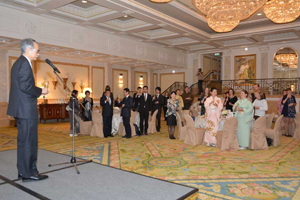 |
| Seventeen members of the UTMA St. Petersburg sub-group, plus eight members of the UTMA which is based in the nation's capital, Moscow, located 633 kilometers (393 miles) away, were present to assist with Makiko's chado introduction program. At the dinner party, Makiko was happy to take commemorative photos with them. |
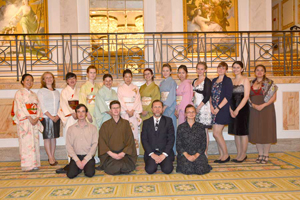 |
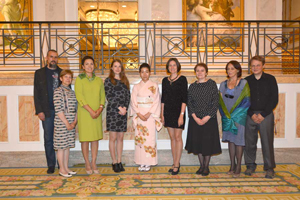 |
| Makiko with the Urasenke St. Petersburg group. | Makiko with Urasenke members who traveled from Moscow. |
| Before returning home to Kyoto, Makiko, together with Mr. and Mrs. Sakurai, flew to Moscow and, on August 27, they were received as guests of the UTMA at a chakai held at the tea room located at Moscow State University’s Institute for Asian & African Studies. The tea room was a donation from Urasenke, and Makiko's father gave it its name, "Seiroan," which literally has the meaning "Pure Dew Abode," but may be interpreted to mean "Pure Russia Abode." |
| HOME |